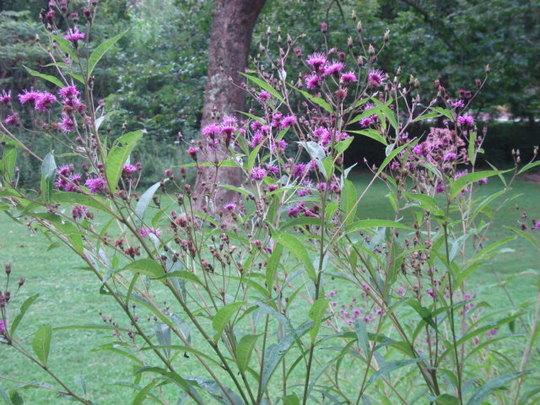Asheville Botanical Gardens, part 1
By lauram
2 comments
This is a beautiful place. I took way too many photos for one blog, so I’ll split it up into two.
From their website:
“The plant collection of the Botanical Gardens at Asheville is represented by over 600 species that are native to the Southern Appalachians. These include many species of trees, shrubs, wildflowers, vines, grasses and sedges. Habitats vary from the sunny and dry to the shaded and wet, allowing many suitable niches for a wide variety of plants. The Gardens is refuge to over 50 species that are considered uncommon, rare or endangered on a regional, state or federal level. Such species include Oconee Bells (Shortia galacifolia), Swamp Pink (Helonias bullata), Broad-leaved Coreopsis (Coreopsis latifolia), French Broad Heartleaf (Hexastylis rhombiformis) and Pale Yellow Trillium (Trillium discolor).
April through May is peak for spring blooms throughout much of the Gardens. . During this time, the slopes are covered with thousands of flowers such as Trilliums (Trillium sp.), Spring-beauties (Claytonia sp.), Crested Dwarf Iris (Iris cristata), Green and Gold (Chrysogonum australe), Wild Geranium (Geranium maculatum) and Foamflower (Tiarella cordifolia). (Our spring flush of Trilliums is – honestly – pretty hard to beat.)
Mid-summer through early fall is the second bloom peak and is generally restricted to the sunnier parts of the Gardens. In these areas numerous species can be found but particularly many members of the Aster family such as Joe-pye Weed (Eupatorium fistulosum), Blazing-star (Liatris sp.), Green-headed Coneflower (Rudbeckia lacinata) and Goldenrod (Solidago sp.). If one looks hard enough, one may find something in bloom nearly year-round. Many visitors are surprised to find Witch-hazel (Hamamelis virginiana) flowering in the middle of fall color or Skunk Cabbage (Symplocarpus foetidus) flowering in winter, sometimes through a light blanket of snow."
Plantings at the entrance to the garden.









Sensitive fern



More sensitive ferns. So this is what they look like when they get enough water…..

Joe Pye weed. These were close to 7’ tall.


Vernonia – New York ironweed



 11 Aug, 2012
11 Aug, 2012 4 likes
4 likes
More blog posts by lauram
Previous post: visit to Amicalola Falls
Next post: Asheville Botanical Gardens, part 2
Comments
Did you also visit the arboretum?
I love these gardens. Definitely inspiring since I try to mostly garden with native plants, although it's a little discouraging at the same time because I live 200 miles further south in the Piedmont. It's too hot here in the summers for many of my favorites to grow really well. I was amazed at the size of the sensitive ferns. Heat and drought do mine in every summer even though they're native ferns.
12 Aug, 2012
Recent posts by lauram
- Fall hike #3: Cloudland Canyon
10 Feb, 2015
- Fall hike #2: Black Rock Mountain, Georgia
10 Feb, 2015
- Fall hike #1: Blood Mountain, Georgia
10 Feb, 2015
- Craggy Pinnacle overlook and endangered plant habitat
11 Aug, 2012
- Asheville Botanical Gardens, part 2
11 Aug, 2012
- visit to Amicalola Falls
28 Jul, 2012
Members who like this blog
-
Gardening with friends since
9 Aug, 2009 -
Gardening with friends since
13 Apr, 2009 -
Gardening with friends since
4 Jul, 2008 -
Gardening with friends since
22 Oct, 2008


Happy memories of a visit here on a wonderful holiday Lauram.
11 Aug, 2012